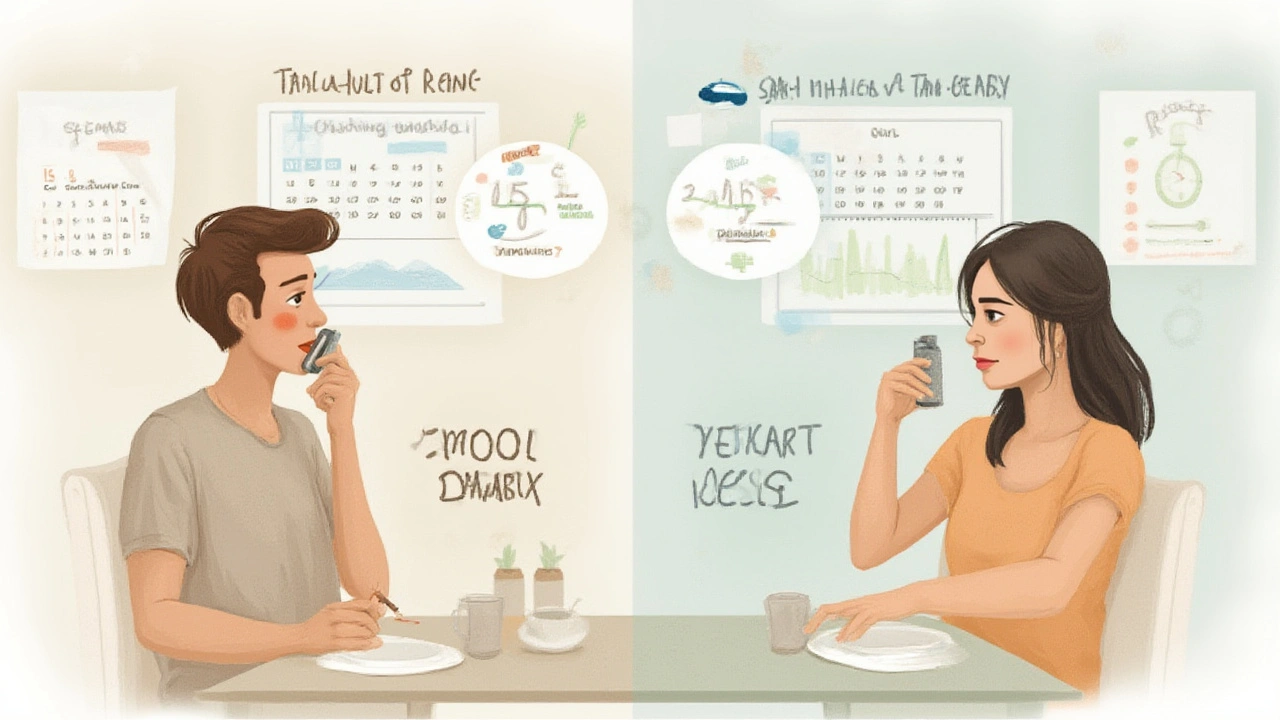If you’ve stood in front of a pharmacy counter and stared down two inhalers with almost identical promises, it’s probably been Breo and Symbicort. The truth? Picking one isn’t just about your lungs—it hits your wallet and your daily routine too. So what’s the real difference, and does one actually deliver better value for the average person with asthma or COPD? Here’s what the numbers (and real-world experience) say in July 2025.
The Science: Efficacy and How Well They Really Work
Breo and Symbicort both pack a punch for asthma and COPD, but they’re not cut from exactly the same cloth. Breo Ellipta combines fluticasone furoate (a potent corticosteroid) with vilanterol (a long-acting beta-agonist). Symbicort, on the other hand, pairs budesonide (another steroid) with formoterol. Both combos calm inflammation and relax airway muscles, so you can actually breathe when pollen goes wild or the city smog creeps in.
Here’s where it gets interesting: Breo is once-daily, while Symbicort asks for your attention twice a day. That sounds minor until you’ve forgotten your second puff during a hectic afternoon. Studies do show similar lung function improvements; for example, a 2023 UK study tracked over 1,000 adults and found that both inhalers raised FEV1 scores (that’s how much air you can force out in one second) by about 15% after 12 weeks. But Breo’s once-daily dosing led to higher reported patient satisfaction—less chance of missing a dose, less fuss overall.
And the speed of relief? Symbicort’s formoterol brings noticeable relief quicker, usually setting in within a few minutes, while Breo takes a bit longer—so if you’re prone to sudden attacks, that might tip the scales. For regular maintenance, they go toe-to-toe, but ask around and people say Breo feels “smoother and simpler.”
Everyday Use: Dosing Schedules and Lifestyle Impact
Who wants to stress over their inhaler schedule all day? Breo’s claim to fame is the one-puff-per-morning routine. For working adults, students, or parents chasing toddlers, that’s a huge deal. Studies show that folks are about 20% more likely to stick to a daily routine if their treatment happens once versus twice. Missing that after-lunch Symbicort dose could mean more symptoms creeping up—and less control over your day.
Symbicort, though, has another trick up its sleeve. It’s used in the “SMART” regimen (Single Maintenance and Reliever Therapy) where the same inhaler is taken both as a daily controller and as-needed for symptoms. That can cut down on rescue inhaler use, something that’s pretty handy for people juggling lots of triggers. Breo’s vilanterol doesn’t work quickly enough for this, so you’ll still need a separate rescue inhaler.
Device design plays a part too: Breo Ellipta comes as a flat, disk-shaped device that’s easy to slip in a back pocket or purse, and some find its dose counter more intuitive. Symbicort’s traditional inhaler can be more fiddly—shaking, priming, and the possibility of running out without realizing it. Ever grabbed an empty inhaler in the middle of an asthma episode? Not fun.
In short, Breo is less work for routine users, while Symbicort is a multitasker for those whose symptoms shift a lot day-to-day.

What Does It Cost? Breaking Down Annual Expenses
Let’s talk dollars. In 2025, inhalers aren’t cheap—especially if you fall into a coverage gap or have a high deductible. Pulling prices from pharmacy chains and insurance data, here’s what you’ll likely pay:
| Inhaler | Monthly Supply (Typical) | Average Cash Price (USD) | Estimated Annual Cost (USD) | Typical Generic? |
|---|---|---|---|---|
| Breo Ellipta (100/25 mcg) | 30 doses | $400 | $4,800 | No |
| Symbicort (160/4.5 mcg) | 120 doses | $380 | $4,560 | Yes (2025) |
Because Symbicort is now available as a generic in the US and most of Europe in 2025, patients with no insurance or those in high-deductible plans are seeing actual receipts as low as $180 per inhaler—a big drop from previous years. Breo, still only branded, delivers fewer puffs per canister, so your annual outlay often winds up slightly higher. Factor in coupons, assistance programs, and formulary coverage (some PBMs favor one brand over the other), and your personal total could swing by $1,000 either way.
For people who don’t need fast-acting symptom relief and prioritize simplicity, Breo’s single daily puff might be worth a few extra bucks. Meanwhile, cash-strapped patients and those who benefit from the flexible SMART approach get better value from Symbicort, especially if they tap into generics or discount programs.
Tips, Alternatives, and What Works for Who?
When deciding between Breo and Symbicort, it really comes down to your lifestyle and coverage. Here’s a quick reality check list to help you sort it out:
- Breo fits best if you are forgetful, value simplicity, or hate hauling multiple devices. If your symptoms are steady and you want to keep daily routines stress-free, Breo can be a game-changer.
- Symbicort makes more sense if you have unpredictable symptoms, need the flexibility to use your inhaler as relief, and if you can snag the cheaper generics now hitting pharmacies in 2025.
- Can’t pick? Some specialists recommend trying one for three months and tracking your symptom diary. Insurance plans sometimes let you swap mid-year without hassle if your doctor says it’s medically necessary.
- Did you know some newer inhalers offer app-based coaching? Both brands are integrating simple reminders, inhaler tracking, and refill alerts by Bluetooth this year. Ask your pharmacist about a "smart" device if you’re tech-savvy.
- If you want to compare more alternatives or get a sense of where Breo and Symbicort stand among the 2025 crowd, check out this breakdown at Breo vs Symbicort. There, you’ll find more head-to-head stats and honest feedback from other users.
People often spend months trapped in the “search for the right inhaler” because cost, comfort, and control all matter. There’s no magic winner, but if you know your priorities—and where the price tags land—there’s a smart answer for you right now. Whether you’re tired of over-complicated routines or you just need that budget stretch, both Breo and Symbicort are reliable, modern choices.

Evelyn Shaller-Auslander
July 24, 2025 AT 15:03Gus Fosarolli
July 25, 2025 AT 09:20Benedict Dy
July 27, 2025 AT 04:35Emily Nesbit
July 28, 2025 AT 11:41John Power
July 30, 2025 AT 07:37Michael Friend
July 31, 2025 AT 23:06Jerrod Davis
August 1, 2025 AT 14:43Dominic Fuchs
August 2, 2025 AT 09:14Tionne Myles-Smith
August 2, 2025 AT 15:47Leigh Guerra-Paz
August 3, 2025 AT 02:22Jordyn Holland
August 3, 2025 AT 23:17Jasper Arboladura
August 5, 2025 AT 07:46Joanne Beriña
August 6, 2025 AT 21:27ABHISHEK NAHARIA
August 7, 2025 AT 16:21Hardik Malhan
August 7, 2025 AT 22:06Casey Nicole
August 8, 2025 AT 15:54Kelsey Worth
August 9, 2025 AT 20:06shelly roche
August 11, 2025 AT 00:46